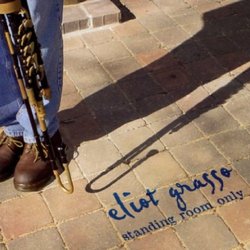| All Artists: Eliot Grasso Title: Standing Room Only Members Wishing: 0 Total Copies: 0 Label: No Label Release Date: 2/15/2004 Genres: Folk, International Music, Pop Styles: British & Celtic Folk, Irish Folk Number of Discs: 1 SwapaCD Credits: 1 UPC: 795103709225 |
Search - Eliot Grasso :: Standing Room Only
 | Eliot Grasso Standing Room Only Genres: Folk, International Music, Pop
"I first met Eliot Grasso in Achill Island, Co. Mayo in the west of Ireland in August 1999 at the island's annual summer school, Scoil Acla. After hearing him play the pipes for just a short while I was immediately aware t... more » |
Larger Image |
CD Details
Synopsis
Product Description
"I first met Eliot Grasso in Achill Island, Co. Mayo in the west of Ireland in August 1999 at the island's annual summer school, Scoil Acla. After hearing him play the pipes for just a short while I was immediately aware that I was in the presence of a master musician, despite the fact that he was still in his mid-teens. Although he had only been playing the pipes for a few years at that stage, his technique and tone had developed to astonishing levels of excellence and richness and his repertoire was seemingly endless. This, combined with his intuitive sense of melodic and technical variation, makes him one of the most creative and dynamic musicians in the contemporary world of Irish traditional music." "One of the most striking facets of Eliot's music is that he displays an intimate knowledge and understanding of every tune he plays. Careful examination of his playing reveals an emphasis on melodic fluidity which he largely achieves by viewing tunes as harmonic structures. This, in turn, enables him to develop original and attractive melodic variations which are among the most distinctive hallmarks of his piping. Another prodigious aspect of his playing is that he has succeeded in taking tunes not normally associated with the pipes and making them accessible to pipers in a manner which both compliments the pieces themselves and the idiosyncrasies of the instrument. He revels in playing tunes in keys such as G and D minor and A major, keys where many pipers fear to tread, despite the fact that many nineteenth-century chanters were designed to facilitate playing in these keys. To his great credit, Eliot has spent many hours absorbing the finer points of the music of a! range! ! of virtuoso performers, both pipers and non-pipers, and this experience in itself has given his music a very solid and authentic basis. His appreciation and performance of the standard piping repertoire leaves nothing to be desired and, furthermore, he has composed many fine tunes himself which show great understanding of both the pipes and traditional music itself."

 Track Listings (11) - Disc #1
Track Listings (11) - Disc #1